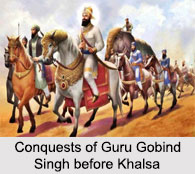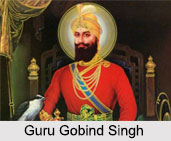 Conquests of Guru Gobind Singh before Khalsa were mostly with the Mughal army. In a span of 23 years i.e. from 1682 to 1705, Guru Gobind Singh fought several battles. Guru Gobind Singh was the 10th Guru and the last of the 10 human form Gurus of Sikhism. He became Guru on November 11th, 1675 at the age of 9.
Conquests of Guru Gobind Singh before Khalsa were mostly with the Mughal army. In a span of 23 years i.e. from 1682 to 1705, Guru Gobind Singh fought several battles. Guru Gobind Singh was the 10th Guru and the last of the 10 human form Gurus of Sikhism. He became Guru on November 11th, 1675 at the age of 9.
The battles fought before the creation of Khalsa have been described below:
Battle of Bhangani
The battle was fought in the year 1688. Bhim Chand`s son was to get married with the daughter of Raja Fateh Shah of Garhwal. They along with Kirpal Chand of Kangra, Sidh Sain of Mandi and some more rajas planned to attack the Guru"s camp. The Guru was aware of the entire area. He planned to meet the hill army in the valley of Bhangani. He occupied a small hillock facing the field of battle. It was a major battle fought by Guru Gobind Singh who displayed a marvel of war tactics and gained success over the overwhelmingly larger enemy.
Battle of Nadaun
The battle was fought in the year 1690. The Kangra hills were under the charge of the Mughal governor at Jammu. The governor had sent Alif Khan with a small army to subdue some hill rajas. Alif Khan had set up his camp at Nadaun on the banks of Beas River. The hill rajas had asked for help from the Guru to fight against the army of Alif Khan. The Guru had extended his help through which the hill rajas defeated the Alif Khan`s army.
 Rustam Khan`s Expedition against Anandpur
Rustam Khan`s Expedition against Anandpur
In the year 1691, the battle was fought by the Sikhs against the army led by Rustam Khan. The governor of Lahore was aware of the increasing strength of the Sikhs. He thus sent a strong force under Rustam Khan to subdue the guru and his army. They planned a surprise attack on the Sikhs. For the execution of the plan, they camped in the dry bed of a seasonal rivulet opposite Anandpur. Sikhs who used to have an early bath noticed the Mughal troops. It was reported to the Guru who immediately collected a Sikh force and made a strong attack on the enemy. The Mughal force could not fight against the attack of the Sikhs and ran away leaving behind their weapons.
Husaini Battle of Guler
In the year 1693, Dilawar Khan, the governor of Jammu, sent another stronger expedition under Hussain Khan to face the Sikhs. Hussain Khan defeated all the hill rajas and charged levies from them to subdue the Sikhs. In the battle he was supported by Kirpal Katoch, Bhim Chand, Himmat Singh and Hari Singh. The Guru on the other side was being helped by Raja Gopal. In the battle Hussain Khan, Kirpal Katoch and Himmat Singh were killed and the Sikhs emerged victorious.
Jujhar Singh"s Operation
Jujhar Singh, a Rajput prince was sent to conquer Guru Gobind Singh. However, the army failed to reach Anandpur. The Guru gathered his disciples and sent them to Anandpur. He also extended help to hill rajas. The Mughal force sent small forces against the Gurus but efforts were in vain.









